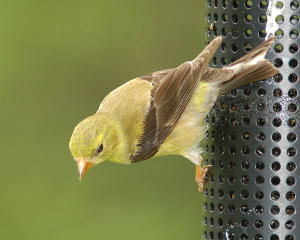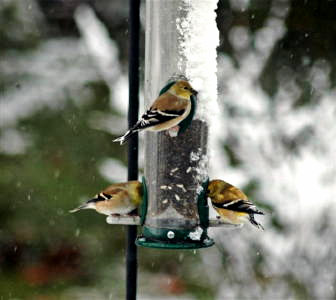Prince Edward County, Ontario, Canada
“Niger” is the Seed. “Nyjer” Is Someone’s Idiotic Attempt at Political Correctness!
Even in John V. Dennis’ “Complete Guide To Birdfeeding,” (1975), it is referred to as “thistle seed,” but the author is quick to point out that the seed is in reality niger seed (Guizotia abyssinica), a seed of the niger plant native to Ethiopia.
The seed, long popular as a food for caged birds, it has only been in recent years that the seed has been available commercially to operators of bird feeders. It is a favourite among goldfinches, siskins, purple finches, house finches and redpolls. Niger bears no relation to the local thistles that grow in the Quinte area. How niger seed became confused with thistle seed in the first place is a mystery, although it could be due to the fact that goldfinches, a favourite at niger feeders – do eat the seeds of thistle plants and also use the down for the lining of their nests.

Most of us learned in Grade 4 that words spelled similar to the word “niger” are to be pronounced with a long “i” . Because some students were absent for that lesson, The Wild Bird Feeding Industry trademarked the name Nyjer (occasionally nyger) in 1998, to eliminate any possibility of offensively mispronouncing the word, never mind that the seed was likely named after the river Niger that flows through the northern parts of Africa. Blame the awkward attempt to spell it differently on political correctness. I have always held that political correctness is a doctrine fostered by a delusional, illogical minority, and rabidly promoted by an unscrupulous mainstream media, which holds forth the proposition that it is entirely possible to pick up a turd by the clean end.
I digress. Whether you spell it niger, nyjer, or nyger, it’s all the same. The seed resembles miniature grains of wild rice and has a high fat and protein content, and contains roughly 40% oil. It stands to reason that the favourite choice among many birds would also be the most costly. However, using niger seed (I will spell it “niger” as I am not a purveyor of so-called political correctness) in the long run ends up saving operators of bird feeders money as the seeds cannot be wasted if offered in a designated niger seed feeder. Manufactured with tiny teardrop feed ports, the birds can extract only one seed at a time, thus preventing waste. The seed is also less inclined to spoil in wet weather, although the very nature of the seed causes it to produce a certain amount of dust which can become congealed in a feeder that has become wet. It is therefore important to periodically take down the niger feeder, hold it horizontally, and shuffle the seed back and forth to disperse the accumulated dust.

In the last few years, numerous niger feeders have been introduced on the market to further the entertainment of watching birds feed on the intoxicating feed. Some niger feeders have been developed with the perches below the feed ports, instead of above. Goldfinches are very adapted to feeding in this position and can be very entertaining to watch as flocks of these birds vie for a perch, then after successfully obtaining one, swing upside down by their feet and feed contentedly from the seed port. On the market too are fine mesh bags from which goldfinches and other niger eating birds can extract the seeds. There are also compressed blocks of niger seed, similar to the suet cakes that are readily available from most stores selling bird feed and supplies. The list goes on, and the ultimate choice is yours.
If you aren’t already offering niger seed as part of your menu, consider trying it this winter. Niger seed can be purchased more economically in bulk from bird specialty stores and farm feed stores that specialize in wild bird feed. However, smaller “trial” packages are readily available at many hardware and big box stores, but expect to pay top dollar when purchasing in such small quantities.